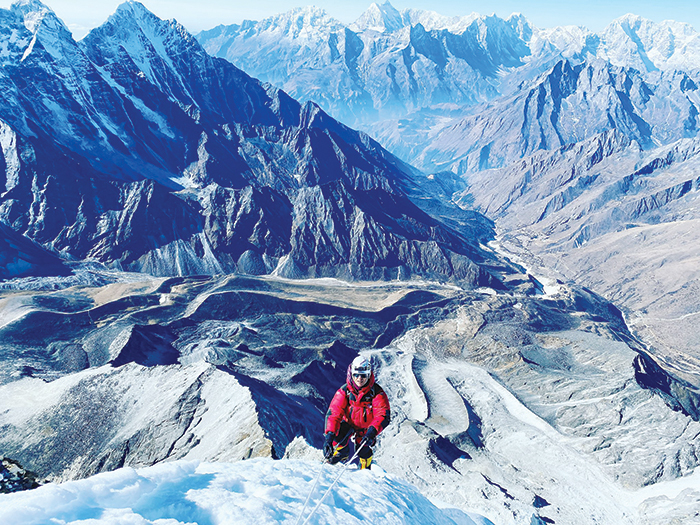
Nadhira Al Harthy experienced a whirlwind of emotions during her recent climb up Mount Ama Dablam, but knew that much like the mountain she was scaling, she needed to be stoic and steady. At 6,812 feet, the mountain is one of Nepal’s most challenging peaks, and also required her to display all of the qualities considered human: determination, courage, and the desire to not back down from a challenge. Take a step wrong, lose control of her emotions, particularly when victory lay so near, and Nadhira was likely to trigger an avalanche of dangerous consequences for herself and her fellow climbers.
“When I was going up to the top, I felt numb, my body only moved towards what my mind dictated to it and it was obedient because I had trained well two days earlier,” she admits. “I was falling asleep with each step I took towards the top. My body was crying out for sleep from the intensity of exhaustion, but I was surprised by the strength of what my mind could control: we needed to control everything, until we ascended together,” recalls Nadhira.
The only Omani among a team of six, Nadhira – who made history by becoming the first woman from the Sultanate to scale Mount Everest in 2019 – and her fellow mountaineers could feel the call of the peak increase with intensity as they edged ever closer to it. It was an emotion that was most strongly felt when they halted at their camp for the night to rest, recover, and forge ahead in the morning. The tests they faced, ergo, were not just punishing on a physical level, but attempted to mentally manipulate them as well.
“We may not have lacked anything from the necessities of daily life during our stay at the Mount Ama Dablam camp, at the same time, you feel as if nothing within you is complete,” she says. “Neither the taste of water, nor sleep, taking a walk, or reading makes you feel comfortable or at ease. You face conflicting emotions throughout the day, making you choose between preparation for the next day and waiting for it to come. Anticipation, enthusiasm, fear and longing, nothing will keep you steadfast here except your willpower to achieve your goal, you must be calm and coherent mentally, and preserve your strength and physical energy,” she goes on to add. “Time passes slowly and sometimes frightens you, and the cold makes everything uncomfortable. Drinking boiling water makes you want to avoid it, and you spend your time living in a tent in which you cannot stand upright.
Ahead of the climb to Mount Ama Dablam, Nadhira and co. spent eight days training for the pitfalls they could experience on the way up and during their descent. Even if they did plan for the technical challenges and tricky terrain, only experience, preparation, and a large portion of luck would save from the sudden, unexpected obstacles they could face up there. “These days were dedicated to training in the methods of climbing that we were to encounter above us,” she recalls. “This is because Mount Ama Dablam is dangerous and difficult to climb and there are many techniques that we must learn in advance.
Nadhira adds: “As part of the climbing programme, we would first go up to the first base camp of the mountain, and then go down to the main camp as an exercise for our bodies to accept the temperature and air pressure found at altitudes of more than 1,000 metres above where we were camped. However, the winds were very strong and we had to descend after climbing 800 metres in the face of the cold, the intensity of the winds, and the effects of high altitude."
Rare days off during their acclimatisation period saw the group organise and maintain their equipment, and explore the surrounding areas to help them get used to the climate and terrain. Among their last stops on the way to Ama Dablam was the village of Fortchi, a picturesque, postcard-perfect hamlet perched nearly 4,000 metres above sea level. The villagers there make a living from agriculture and raising yaks. As the atmosphere thinned out en route to the mountain, so did the number of people on the roads. “From the village of Fortchi to the main camp, the road steadily became devoid of signs of life, because of the altitude near the mountains. We arrived at the camp, praise be to God, after six hours’ walking, with the temperature at -10 degrees Celsius. Our climbing phase began soon afterwards.”
At Fortchi is a mountaineering school set up by the famous American outdoorsman Conrad Anker, which offers education to local climbers, and serves as a sobering reminder of all those who’ve died while trying to climb up to the ceiling of our planet. She was able to explain in great detail the mental and physical tests, the yearning to return to the comforts of her home and her warm bed, but she knew that to turn back would be to give up on a challenge she’d come so far to overcome. Had Nadhira retreated the way she had come, her failure would gnaw at her, only increasing in intensity with each passing day.
“Resting in a sleeping bag everyday makes you want to return to your comfort zone, but also what makes you endure all of that and more, is to remind your heart and mind that all of these are obstacles and simple challenges in front of achieving your greatest goal,” says Nadhira. “This is when you tell yourself and your mind to be steadfast in front of the challenge, to be strong, and not give up on achieving your goals.”[email protected]